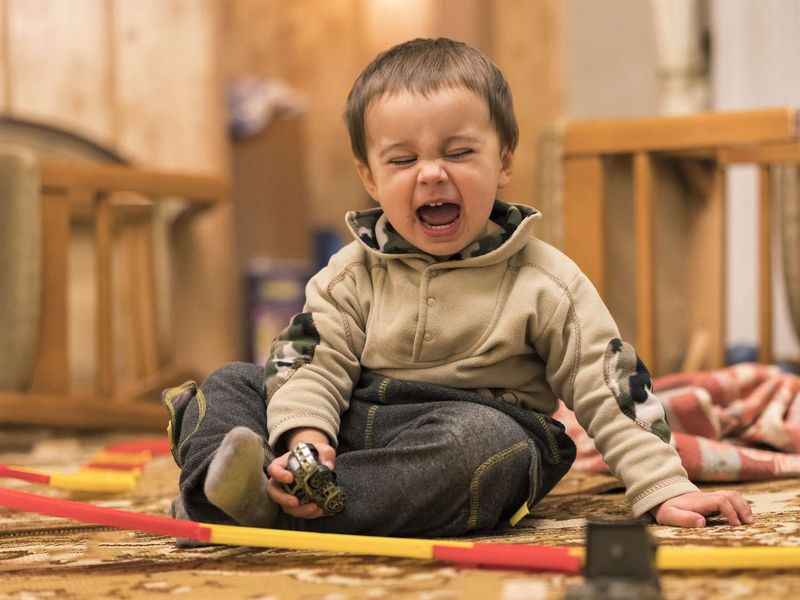Raising children can be a delicate balance of love, discipline, and nurturing independence. Sometimes, without even realizing it, parents might be cultivating habits that lead to entitled behavior. This list explores 17 subtle signs that might indicate you are raising a little emperor.
These behaviors can reflect a child’s sense of entitlement, emotional immaturity, or a lack of boundaries. The goal is to identify the signs early and address them with empathy and understanding, setting healthy boundaries that promote growth and maturity.
1. Meltdowns when they don’t get their way
A tantrum over a denied toy at the store isn’t uncommon. However, persistent meltdowns signify deeper issues. Picture a five-year-old at a toy store, surrounded by colorful treasures. When told “no,” the child collapses into tears, drawing attention from passersby.
This behavior might stem from unmet emotional needs and a lack of coping mechanisms. Regular episodes can strain parent-child dynamics. Equipping children with emotional tools is crucial. Encourage expressing emotions through words, not tears.
With patience and guidance, these outbursts can be managed. Addressing the root cause helps children understand the world doesn’t oblige their desires. Teaching patience fosters resilience, paving the way for well-rounded adulthood. Navigating these moments thoughtfully builds trust and mutual respect.
2. Interrupting conversations with no awareness
Imagine a lively family dinner, stories and laughter filling the room. Suddenly, a six-year-old interjects, oblivious to ongoing conversations. This behavior often goes unnoticed, yet it mirrors a child’s struggle with patience and awareness. Interrupting displays a lack of understanding of social boundaries.
Teaching children to wait their turn builds empathy and listening skills. Role-playing scenarios can be a fun way to practice patience. Explain the importance of giving others a chance to speak. By modeling respectful conversation, parents can instill these values.
Over time, children learn to engage in discussions thoughtfully, valuing others’ perspectives. Cultivating these habits early on aids in developing strong communication skills.
3. Always expecting a reward for basic behavior
Incentives can motivate, but what happens when a child always expects a reward? Consider a seven-year-old proudly displaying a gold star, ready for another. If rewards become the norm, children may struggle to act without them. Basic behavior should stem from understanding, not incentives.
Explain why actions matter beyond rewards. Encourage intrinsic motivation by celebrating efforts, not just outcomes. Share stories of perseverance paying off. By balancing praise with encouragement, children learn to appreciate efforts’ inherent value.
Teaching self-motivation fosters independence, helping children navigate life’s challenges with confidence. This shift in perspective empowers children to find joy in personal growth.
4. Disrespecting adults without correction
An eye roll in class might seem harmless, yet repeated disrespect reflects deeper issues. Picture an eight-year-old dismissively rolling their eyes at a teacher’s guidance. Without correction, such behavior can erode respect for authority. Addressing this requires a gentle yet firm approach.
Discuss respect’s importance and role-play scenarios to understand its impact. Encourage empathy by considering others’ feelings. Reinforce positive behavior with praise, not punishment. Set clear expectations and follow through consistently.
By fostering an environment of mutual respect, children learn the value of consideration and kindness. These lessons shape character, laying a foundation for respectful relationships.
5. Struggling to hear “no” without exploding
Hearing “no” can be challenging for anyone, more so for a child. Imagine a nine-year-old at a park, face scrunched in frustration after being told playtime is over. Explosive reactions can indicate an inability to process disappointment. Teaching children to handle “no” gracefully is essential.
Talk about emotions and practice role-playing scenarios. Provide alternatives to channel frustrations. Encourage deep breathing or taking a walk. Celebrate small victories in managing emotions. These strategies build resilience and emotional maturity.
By learning to accept limitations, children grow into adaptable adults. Guiding them through tough emotions strengthens their ability to cope with life’s ups and downs.
6. Blaming others for their own mistakes
Accountability is key to growth, yet blaming others can become a habit. Picture a ten-year-old during a school project mishap, fingers pointed at a peer. This behavior stems from a fear of failure and lack of ownership. Discuss the value of honesty and role-play owning mistakes.
Highlight the growth from acknowledging errors. Encourage reflection on actions and their impact. Praise accountability and offer support in problem-solving.
By fostering a safe space for learning from mistakes, children understand the power of taking responsibility. These lessons build integrity and self-awareness, essential traits for personal development.
7. Treating others’ time as disposable
Consider an eleven-year-old arriving late to a friend’s birthday celebration, unfazed by others’ wait. This behavior might signify a lack of understanding of time’s value. Teaching children to respect others’ time fosters empathy and responsibility.
Discuss the impact of being punctual and role-play scenarios. Highlight the importance of commitments and planning. Celebrate punctuality and its impact on relationships. These discussions instill a sense of responsibility, teaching children the value of others’ time.
By understanding the ripple effect of actions, children develop a sense of accountability. These skills are crucial for nurturing strong, respectful relationships throughout life.
8. Taking more than they give
Imagine a twelve-year-old at a party, eagerly grabbing more candies than others. This behavior can indicate an imbalance in understanding generosity. Discuss the value of sharing and role-play scenarios. Encourage empathy by considering others’ needs.
Highlight the joy of giving and the impact of small gestures. Celebrate acts of kindness, big and small. By teaching children to share, they learn the importance of community and collaboration. These lessons foster empathy and social awareness.
Understanding the balance between giving and receiving prepares children for meaningful, fulfilling relationships. These skills are essential for contributing positively to society.
9. Refusing to help with age-appropriate tasks
Picture a thirteen-year-old at home, phone in hand, refusing to help with chores. This behavior can signal a disconnect between independence and responsibility. Discuss the importance of contributing to family life. Highlight age-appropriate tasks and their role in personal growth.
Encourage ownership of responsibilities through praise and recognition. Discuss the impact of shared efforts on family dynamics. By involving children in household tasks, they learn valuable life skills. These experiences foster independence and accountability.
Teaching children to contribute prepares them for challenges they’ll face as they grow. Empowering them with responsibility builds confidence and resilience for the future.
10. Believing every event should center around them
At a family gathering, a fourteen-year-old demands everyone’s attention, leaving others sidelined. This behavior may reflect an inflated sense of self-importance. Discuss the value of inclusivity and empathy. Encourage listening to others’ stories and celebrating shared experiences.
Role-play scenarios to understand the dynamics of group settings. Praise moments of selflessness and encourage reflection on others’ perspectives. By teaching children to appreciate diverse viewpoints, they learn the importance of community.
These discussions foster empathy and social skills. Understanding the balance between self and others prepares children for meaningful relationships. These lessons are critical for thriving in social environments.
11. Being constantly “bored” despite many toys
A five-year-old, amidst a sea of toys, sighs out of boredom. This situation might indicate a lack of engagement or creativity. Explore activities that spark curiosity and imagination. Encourage open-ended play that challenges the mind. Rotate toys to maintain interest and excitement.
By fostering an environment that promotes exploration, children learn to entertain themselves. These practices nurture creativity and problem-solving skills.
Understanding the value of independent play helps children develop resilience. Instilling curiosity and a love for learning prepares them for lifelong exploration. Encouraging imaginative play builds confidence and adaptability, essential traits for personal growth.
12. Expecting immediate gratification
Picture a six-year-old at the park, eagerly waiting for ice cream, visibly impatient. This behavior underscores the challenge of waiting. Discuss the importance of patience and its role in personal development. Role-play scenarios to practice waiting gracefully.
Encourage activities that require perseverance, like puzzles or gardening. Celebrate small victories that result from patience. Teaching children to value delayed gratification fosters resilience and self-control. These lessons build a foundation for managing expectations.
Understanding the balance between desires and reality prepares children for life’s challenges. These skills are crucial for personal growth and emotional maturity.
13. Manipulating with tears or tantrums
In the store aisle, a five-year-old employs tears, seeking a desired toy. This behavior can indicate manipulation tactics. Discuss the impact of emotions on interactions. Encourage honest communication of desires and feelings. Role-play scenarios to practice expressing needs respectfully.
Praise honesty and reinforce positive behavior through encouragement. By addressing emotional manipulation, children learn to communicate effectively. These discussions foster self-awareness and empathy.
Understanding the balance between emotions and actions builds integrity. Teaching children to express themselves honestly prepares them for healthy relationships. These skills are essential for personal development and emotional intelligence.
14. Overreliance on screens for regulation
During a sunny day at the park, a seven-year-old remains engrossed in a tablet, missing the world around them. This behavior might indicate reliance on screens for emotional regulation. Discuss the importance of balancing screen time with physical activities.
Encourage outdoor play and social interactions. Role-play scenarios to explore emotions without screens. Highlight the joy of experiencing nature and friendships. By fostering an environment that promotes diverse activities, children learn to self-regulate.
These practices nurture creativity and resilience. Understanding the impact of screen time on emotions builds awareness. Encouraging balanced activities prepares children for a well-rounded lifestyle.
15. Reacting poorly to being held accountable
Upon being gently scolded for a spill, an eight-year-old reacts with anger. This behavior highlights struggles with accountability. Discuss the growth from acknowledging mistakes. Role-play scenarios to practice accepting responsibility.
Encourage reflection on actions and their consequences. Praise moments of ownership and offer support in problem-solving. By fostering a safe space for learning from mistakes, children understand the power of accountability. These lessons build integrity and resilience.
Understanding the balance between actions and consequences prepares children for life’s challenges. Teaching children to embrace accountability fosters self-awareness and emotional maturity.
16. Treating caregivers like staff, not people
A nine-year-old demands snacks from a caregiver as if giving orders. This behavior may reflect a lack of appreciation for caregivers’ efforts. Discuss the importance of mutual respect and empathy. Role-play scenarios to understand caregivers’ perspectives.
Encourage gratitude and acknowledgment of others’ contributions. Praise moments of kindness and consideration. By fostering an environment of mutual respect, children learn the value of empathy. These discussions build appreciation and social awareness.
Understanding the balance between demands and gratitude prepares children for respectful relationships. These skills are critical for nurturing strong, compassionate connections.
17. Rarely saying “thank you” and meaning it
At the dinner table, a ten-year-old mumbles a half-hearted “thank you,” lacking sincerity. This behavior might indicate a misunderstanding of gratitude’s importance. Discuss the impact of genuine appreciation on relationships.
Role-play scenarios to practice expressing gratitude wholeheartedly. Encourage reflection on others’ efforts and contributions. Praise moments of genuine thanks and encourage empathy. By teaching children to express gratitude sincerely, they learn the value of acknowledging others.
These discussions foster appreciation and social skills. Understanding the balance between giving and receiving thanks builds meaningful connections. These lessons are essential for developing strong interpersonal relationships.


















